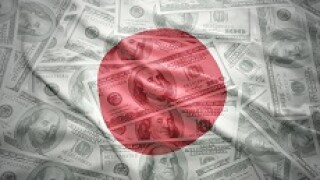Japan
-
Public sector issuers navigated a choppy start to the week to print strong dollar trades, but some SSA bankers worry that the problems that brought that early volatility are far from resolved.
-
The revival of equity-linked bond issuance in Europe was crowned on Thursday by the launch of one of the biggest deals this year, for ANA Holdings, which owns All Nippon Airways. Nomura was the bookrunner.
-
Japan Finance Organization for Municipalities breezed through a short dated dollar trade on Thursday, picking up a more than doubly subscribed book at what bankers away from the trade put at a low single digits concession.
-
Kommunalbanken made what bankers away from the trade described as an “excellent” choice of tenor with a dollar benchmark on Wednesday as it tightened pricing from guidance — something that not every issuer has been able to achieve in the currency over the last two weeks. Meanwhile, a Japanese issuer mandated for a trade that bankers expect to go well despite geopolitical tensions in Asia.
-
The Development Bank of Japan (DBJ) is set to go on the road to promote its third sustainability bond. Bank Nederlandse Gemeenten has also unveiled plans to return to SRI this year.
-
Two SSA borrowers printed dollar benchmarks on Wednesday, pulling off solid trades in spite of some investors put off by tight spreads.
-
Mitsubishi UFJ Financial Group has picked its own investment bank and Morgan Stanley to arrange the sale of its first ever holding company level senior bond in the euro market.
-
Public sector borrowers are mainly keeping to the short end of the dollar curve this week, but at least one top tier issuer is understood to be considering a 10 year dollar benchmark in the next few weeks.
-
Barclays is rebuilding its franchise in Asia Pacific with three senior hires focusing on the China and Japan markets, according to a memo seen by GlobalCapital Asia.
-
The Japan Bank for International Co-operation (JBIC) found traction with a stellar four tranche offering on Thursday, gratifying investors feeling the pinch from a year that has been somewhat light on dollar supply.
-
The Japan Bank for International Cooperation (JBIC) hit the whole dollar curve on Thursday, launching a quadruple tranche dollar benchmark and managing to pull in spreads by 4bp-6bp on all four tranches.
-
China’s State Administration of Foreign Exchange (Safe) says the country will not devalue the renminbi, Hong Kong’s renminbi deposits fall in May, and China welcomes Japan to participate in One Belt One Road (OBOR).










